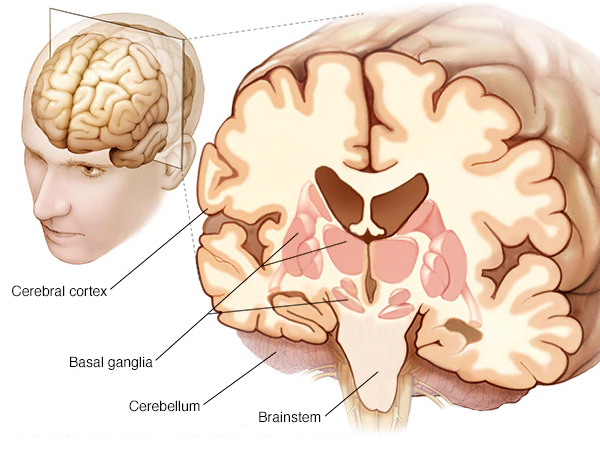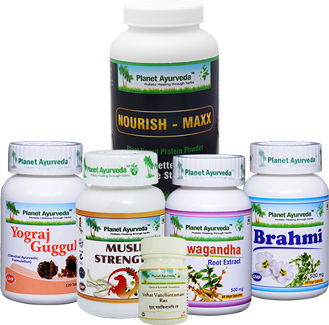Herbal Remedies for Progessive Supranuclear Palsy Treatment
ABSTRACT
Progessive supranuclear palsy is a uncommon brain disorder that causes difficulty in walking, eye movement, and balance. The brain is an organ made up of a large number of nerve tissues that is protected within a hard structure known as the skull. It mainly includes functions such as it helps in regulating blood pressure and breathing, releases hormones and processes sensory information. Brain health is an emerging and growing concept that provides plasticity, functioning across life.
Numerous interconnected social and biological genetics play an important role in normal functioning of the brain. The cerebrum is the largest part of the brain and divides into 2 hemispheres. Each hemisphere is divided into regions called lobes. There are 4 lobes- Frontal lobes, parietal lobe, temporal lobe, occipital lobe. There are many conditions affecting the brain such as Cerebrovascular injury such as strokes, Neurodegenerative disorders such as Parkinson’s disease, dementia, and many more. It includes symptoms like headache, dizziness, speech problems, seizures, dilation of one or more pupils. We will study about its causes, symptoms, and its ayurvedic aspect further in this topic.
INTRODUCTION
Progessive supranuclear palsy is a degenerative disease which involves the deterioration of the brain cells which further causes loss of balance, slowing of movements, difficulty in moving eyes. The cause of this disease is unknown but there is accumulation of a protein called Tau within the brain. Sometimes it can be misdiagnosed with Parkinson’s disease. This condition keeps on worsening over time. Neurodegenerative refers to the collapse of the nervous system where there is death of numerous cells. Supranuclear refers to damage to localized nuclei in the brain. It is also known as Steele Richardson Olszewski syndrome. It worsens over time and leads to life threatening conditions such as pneumonia, swallowing problems. Supranuclear refers to the region of the brain above 2 small areas called nuclei. It is more commonly seen in men than women and it affects the middle aged or older people.

CAUSES
- Progessive supranuclear palsy occurs mainly when brain cells are damaged resulting in buildup of protein known as Tau.
- Tau occurs in the brain and usually breaks down before it reaches a high level.
- In people who are suffering from Progessive supranuclear palsy the build up protein doesn’t break down and forms harmful clumps in the brain.
- Clumps of tau are progressively seen in neurodegenerative disorders such as in Alzheimer’s disease.
- Mitochondrial dysfunction can also cause progessive supranuclear palsy.
- Substantia nigra is the most affected part of the brain where palsy symptoms are visible.
- Clumps formed in the brain cells damages the neurons
SIGNS AND SYMPTOMS
- Change in behavior such as irritability
- Slurred speech
- Difficulty in swallowing
- Muscle stiffness
- Loss of balance while walking- Tendency to fall back is an early symptom of this disease.
- Depression
- Dizziness
- Rigid facial muscle
- Urine incontinence
- Sleep disruption
- Constipation
- Poor eyelid function
- Contracture of the facial muscles.
- Dementia
COMPLICATION
- Falling which could lead to fractures, brain injury.
- Difficulty focusing your eyes
- Problems during inhaling food or liquid into the airway (aspiration).
- Pneumonia which is the most common cause of death in progessive supranuclear palsy.
- Impulsive behavior
TYPES
It is divided into following categories
- Classical Richardson syndrome
- Progessive parkinsonism and Progessive supranuclear palsy -pure akinesia with gait freezing
- Progessive supranuclear palsy – C
- Progessive supranuclear palsy induced by Annonanceae (known as custard apple)
DIAGNOSIS
- Progessive supranuclear palsy diagnosis is difficult as it has signs and symptoms similar to Parkison disease. So doctor suspect following:
- Don’t have tremors
- Unexplained falls
- Response to parkinson medication
- MRI (magnetic resonance imaging)
TREATMENT
- Parkisnson’s disease medications- It increases the level of brain chemical which controls the muscle movements, the effectiveness of this medication is temporary lasting for 2-3 years. Medications include- Levodopa, Levodopa with anticholinergic agents.
- Onabotulinumtoxin A- Is injected in small doses into muscle of your eyes as botox helps muscles to contract which improves spasms of eyelid.
- Prism lenses- These lenses are very helpful as they ease the problems with looking downwards. These lenses allow people to look downwards without rolling their eyes downwards.
- Physical therapy- It helps to improve balance, facial exercise, Gait balance and training helps to relieve symptoms of progessive supranuclear palsy.
- Mental health- It is counseling with a therapist who improves the copying technique.
- Antidepressant medications- The most commonly antidepressant medications are- Fluoxetine, Amitriptyline (Elavil).
- As progessive supranuclear palsy worsens, the patient can’t swallow which prevents him/her from eating and drinking so surgery is recommended (GASTROTOMY).
AYURVEDIC MANAGEMENT
Progessive supranuclear palsy is caused due to vitiated vata dosha. Vata dosha is responsible for control of all the nervous functions in the body. Vata dosha is a tantra which runs the machine of our body. When vata dosha gets disturbed it drives the body crazy, disturbs the events in the body and causes diseases. Vatavyadhi is divided into 2 parts- Dhatukshayajanya avastha pain is reduced by touching. But in Margavrodhajanya pain is aggravated after touching. Due to intake of vata aahara and vihaar, vata dosha gets vitiated which gets stuck in the rikta strotasa and loses their qualities like smoothness and stickiness. On occupying the srotas this vitiated vata will produce Ekanga and Sarvanga diseases. Two pathology plays an important role in vatavyadhi there is decrease in dhatu and srotas become empty, but in margavarodhjanya vatavyadhi there is obstruction due to dhatu, maal and vata dosha gets stagnated which leads to dysfunction in organs.
CAUSATIVE FACTORS OF VATA VYADHI
- Intake of dry food, cold food.
- Improper administration of vamana, virechana.
- Fear
- Irritation
- Excessive consumption of spicy foods.
PREMONITORY SYMPTOMS
- Stiffness of joints
- Horripilations
- Lameness
- Sleeplessness
- Numbness in body parts
- Convulsions
- Pricking type of pain.
TREATMENT
- Snehan
- Swedan
- Mridu shodhana (virechana)
- Deepan and Pachana sneha
- Massage with medicated oils
- Hot and fresh foods
- Pouring of medicated oil in the form of seka
- Consume sour, sweet food
HERBS USEFUL FOR PROGESSIVE SUPRANUCLEAR PALSY
- Turmeric- Turmeric (Curcuma longa) rectifies the metabolic fire due to its ushna veerya which further cleanses and detoxifies the ras, enables free circulation to each part of the body and restores the normal functioning of the body. Haridra removes the blocked channels and enables the free movement of vata and makes dhatu nourished and replenished.
- Shilajit- Shilajit plays an important role in treating urinary disorders, skin disease, worms infestation, mental disorders. Shilajit plays an important role as it has fulvic acid which is preventing Tau protein from aggregating so it is useful in Alzheimer’ disease and is reducing anorexia. It helps to maintain blood pressure, strengthens the skeletal system, brings energy and stamina.
- Amalaki- Amalaki is the best anti-aging herb which balances all the three doshas in the body, useful in bleeding disorders, fever, and has a rejuvenative property. It is rich in vitamin C and antioxidants which nourish the tissues. Amalaki promotes healthy circulation, tonify the muscles, enhances memory and brings a sense of calm to mind. It clears and detoxifies the system known as Rasayana herb.
HERBAL REMEDIES BY PLANET AYURVEDA FOR PROGESSIVE SUPRANUCLEAR PALSY
Ayurvedic medicines treat the disease as the root cause for maintaining a healthy life. Planet ayurveda is a brand which has been serving pure extract in the form of tablets, capsules, powder which are prepared under guidelines of Ayurvedic board. The medicines prepared are free from any chemicals and preservatives, are 100% pure and vegetarian. Ayurvedic medicine reduces the risk of recurrence of disease and causes no side effects of the treatment as it is pure plant based extracts.
PRODUCTS LIST
- VRIHAT VATCHINTAMANI RAS
- MUSLI STRENGTH
- YOGRAJ GUGGUL
- ASHWAGANDHA CAPSULE
- NOURISH MAXX
- BRAHMI CAPSULE

PRODUCTS DESCRIPTION
1. Vrihat Vatchintamani Ras
Vrihat vatchintamani ras is one of the classical formulations which is effective in balancing vata dosha. It is prepared in the form of tablets by planet Ayurveda using ingredients like- Swarna bhasma (Calx of Gold), Rasa Sindoor (Red sulphide of mercury), Praval bhasma (Calx of coral) and many more. These tablets are helpful in maintaining cardiac health by strengthening the muscles, used in a variety of diseases like diabetes, splenomegaly, hypertension. This tablet has rajata bhasma which is an excellent drug for mental health disorders and has antidepressant property.
Dosage– 1 tablet twice daily to be chewed with plain water after meals.
2. Musli Strength
Musli strength is a great formulation prepared by planet ayurveda in the form of capsules using ingredients like- Safed Musli (Chlorophytum borivilianum) Gokshura (Tribulus terrestris). It helps in strengthening of the body and bone, uplifts the power of the reproductive system as it increases the quality and quantity of sperms. It has gokshura which is a diuretic and has cleansing properties on the urinary system and on lithotriptic activity. Tribulus has wound healing properties and balances tridosha.
Dosage– 1 capsule twice daily with plain water after meal
3. Yograj Guggul
Yograj guggul are herbal tablets formulated by planet ayurveda using ingredients like- Guggul (Commiphora mukul), Amalaki (Emblica officinalis),Cardamomum (Elettaria cardamomum), Rasna (Pluchea lanceolata), Chitraka (Plumbago zeylanica) and many more. It is a useful preparation used in the treatment of splenomegaly, abdominal tumours, bone marrow, and increases digestion power. Yograj guggul is widely used in treatment of rheumatoid arthritis and gout.
Dosage– 2tablets twice daily with lukewarm water.
4. Ashwagandha Capsules
These are single herbals capsules formulated by planet ayurveda using standardised extract of Ashwagandha (Withania somnifera). Ashwagandha has rejuvenating that helps to maintain proper nourishment of the tissues. These capsules are useful in back stiffness, muscle fatigue, and have the property of balancing vata dosha in the body as vata dosha governs all the movement in the body. Ashwagandha has antioxidant, immunting enhancing, anti stress, rejuvenating properties. It inhibits inflammation and improves memory.
Dosage– 1 capsule twice daily with plain water after meals.
5. Nourish Maxx
Nourish maxx is a herbal powder preparation formulated by planet ayurveda using various ingredients like- Shatavari (Asparagus racemosus), Ashwagandha (Withania somnifera), Gokshura (Tribulus terrestris), Safed musli (Chlorophytum borivilianum). It helps to nourish the entire body, useful for both males and females, natural protein supplement for weight gain, bodybuilder, short height. Helps to maintain proper functioning of the organs. This powder has ashwagandha which helps to maintain and help the body to adapt to various types of stress.
Dosage– 1 tsp twice daily with normal water.
6. Brahmi Capsule
Brahmi capsules are single herbal preparation which is formulated by planet ayurveda using standardised extract of Brahmi (Bacopa monnieri). Brahmi is the best brain tonic which wonderfully works on brain health, promotes the regeneration of cells of the brain , so very helpful in Progessive supranuclear palsy, Alzheimer’s disease. It shows a miraculous effect on the liver as it removes the toxins from the body and promotes the functioning of the liver. Brahmi is useful in irregular menstruation, impotence, premature ejaculations, helps to relieve and prevent stress.
Dosage– 1 capsule twice daily with plain water.
CONCLUSION
Progessive supranuclear palsy is a uncommon brain disorder that causes difficulty in walking, eye movement, and balance. The cause of this disease is unknown but there is accumulation of a protein called Tau within the brain.Vata dosha is responsible for control of all the nervous functions in the body. Further we studied its purva roop and many herbal remedies to cure this vata vyadhi. Planet Ayurveda also prepared many formulations which are useful in this disease without any side effects and maintained a healthy lifestyle for future needs.


